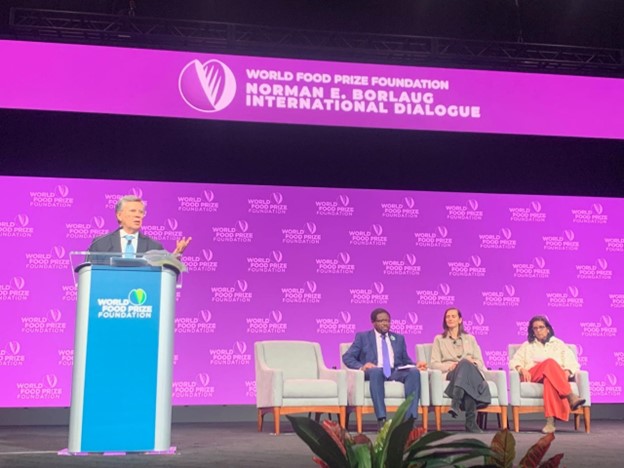This high-level event, a global reference on agriculture and food issues, brings together world leaders and renowned experts in agricultural development, public policy, best practices, and nutrition. It is organized by the World Food Prize Foundation (WFP) in Des Moines, Iowa.

Des Moines, Iowa, 31 October 2024 (IICA) – Animal production has a future as a key tool for food security and environmental conservation, and that future is linked to science and innovation.
At the 2024 Norman Borlaug International Dialogue, the Director General of the Inter-American Institute for Cooperation on Agriculture (IICA), Manuel Otero, participated in a panel on innovation and future trends in sustainable animal production, which brought together voices from production, research, and civil society.
This high-level event, a global benchmark for agriculture and food issues, brings together world leaders and renowned experts in agricultural development, public policy, best practices, and nutrition. It is organized by the World Food Prize Foundation (WFP) in Des Moines, Iowa.
The discussion highlighted that animal production is and will remain an important part of agrifood systems and that producers are making progress in terms of sustainability and production responsibility, especially in the challenging context of the climate crisis, though work still remains.
One conclusion was that public policymakers must play an active role in providing innovative tools and setting reasonable goals for stakeholders in terms of productivity and sustainability. It is essential to ensure that new technologies are accessible to all, especially small producers.
Past and Future
The Borlaug Dialogue is inspired by the vision of scientist Norman Borlaug, creator of the Green Revolution, and aims to discuss crucial agricultural issues by integrating past experience, current innovation, and the most urgent needs of the future.
The panel on animal production included Surita Sandosham, CEO of Heifer International, an organization working with family farmers to improve their food security and income; Appolinaire Djikeng, Senior Director of Livestock-Based Systems at CGIAR and Director General of the International Livestock Research Institute (ILRI), a research center active in developing countries; and Judith de Vor, a dairy farmer from the Netherlands and member of the Global Farmer Network (GFN), alongside Manuel Otero.
“Science and innovation play an irreplaceable role in the present and future of animal production, with producers as the key players of a new era and more public-private partnerships,” said IICA’s Director General, who led the conversation both as a panelist and by introducing the topics that guided the other participants’ contributions. “Animal production is undoubtedly in a transition to becoming a more regenerative sector, based on the concept of the circular economy and more integrated with forests and crop production,” he added.
Otero pointed out that Latin America and the Caribbean is the world’s leading provider of animal protein, being a leader in the production of red meat, poultry, and dairy. He noted that the region has over 400 million heads of cattle and more than 3.3 million livestock producers, primarily small and medium-sized.
“We represent 26% of global production and 28% of exports, playing a fundamental role in global food and nutritional security,” he stated.
The future of animal production, Otero explained, involves becoming more efficient, reducing its carbon and water footprints, and placing greater emphasis on animal welfare.
The conversation addressed the realities of different regions, as De Vor provided a European perspective, Djikeng shared experiences from Africa, and Sandosham focused on Asia.
Sandosham, originally from Singapore with over 20 years in civil society organizations, spoke about the importance of building alliances and promoting collective action to improve the quality of life of family farmers and other vulnerable groups.
“At Heifer International, we work to foster relationships between low-income farmers and the private sector to facilitate producers’ access to machinery and technology that improve productivity and income,” said Sandosham, who shared positive examples from Asia.
Djikeng described ILRI’s work—an organization with offices in Nairobi, Kenya, and Addis Ababa, Ethiopia—which focuses on making new technologies affordable and culturally appropriate for small farmers in Africa and Southeast Asia. He emphasized that animal production is of great economic and social importance in developing countries.
Djikeng noted that livestock productivity in rural African communities is extremely low, while other challenges, such as lack of market access, severely impact the food security of rural populations.
De Vor, who was raised on a family dairy farm near Utrecht in the Netherlands and now operates an educational farm with her husband and 120 cows, shared a different perspective from that of a developed country. “For us, the cows aren’t just numbers; each one has a name,” she revealed.
De Vor explained that soil health and biodiversity conservation are non-negotiable principles on her farm, where attention is also given to animal welfare, and the farm generates its own electricity.
Her farm regularly hosts school groups and families to showcase the realities of agricultural life and spark interest in farming.
More information:
Institutional Communication Division.
comunicacion.institucional@iica.int











